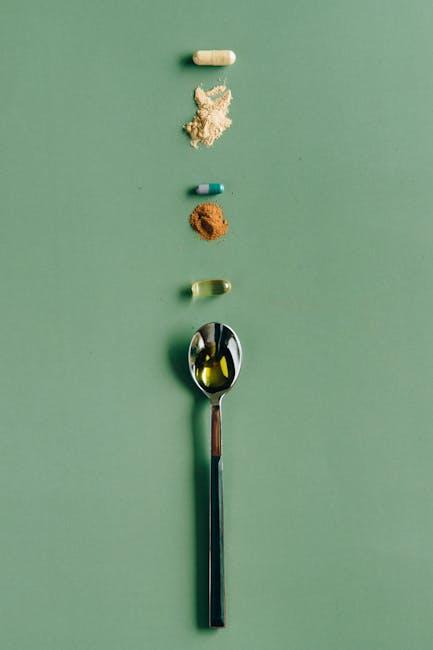In the complex battlefield of the human body, the immune system stands as a vigilant guardian, constantly fending off invisible invaders. Yet, like any formidable force, its strength hinges on the quality of its provisions. “” explores the intricate relationship between what we eat and how well our body can protect itself. Beyond mere sustenance, food becomes a strategic ally—nourishing cells, regulating inflammation, and fine-tuning responses to threats. This article delves into the science of nutrition as a cornerstone of immunity, revealing how everyday dietary choices can empower our body’s natural defenses in the ongoing quest for health.
Table of Contents
- The Nutritional Building Blocks of a Resilient Immune System
- Understanding Micronutrients that Enhance Immune Response
- Balancing Gut Health to Support Immune Function
- Practical Dietary Habits to Strengthen Your Body’s Defenses
- In Retrospect

The Nutritional Building Blocks of a Resilient Immune System
At the core of a fortified immune system lies a harmonious blend of essential nutrients working in concert to support your body’s natural defenses. Vitamins such as A, C, D, and E play pivotal roles—from enhancing white blood cell function to acting as powerful antioxidants that neutralize harmful free radicals. Minerals like zinc, selenium, and iron are equally crucial, facilitating antibody production and maintaining the integrity of immune tissues. Incorporating a diverse array of colorful fruits and vegetables ensures a rich supply of these micronutrients, creating a nutrient-dense environment where immune cells thrive.
Beyond vitamins and minerals, macronutrients also shape immune health. Amino acids derived from high-quality proteins provide the building blocks for antibodies and cytokines, essential molecules in immune signaling. Healthy fats, particularly omega-3 fatty acids, modulate inflammation and support cellular communication within the immune network. Here’s a quick overview of the key nutrients and their roles:
| Nutrient | Primary Immune Role | Food Sources |
|---|---|---|
| Vitamin C | Antioxidant, enhances pathogen destruction | Citrus fruits, bell peppers, strawberries |
| Zinc | Promotes white blood cell development | Shellfish, pumpkin seeds, lentils |
| Protein | Supports antibody and cytokine synthesis | Lean meats, beans, tofu |
| Omega-3 Fatty Acids | Regulates inflammation | Salmon, flaxseeds, walnuts |

Understanding Micronutrients that Enhance Immune Response
Micronutrients are the unsung heroes of the immune system, functioning as vital cofactors in the complex biochemical processes that keep pathogens at bay. Among the key players are vitamins A, C, D, and E, each contributing uniquely—from bolstering antioxidant defenses to modulating inflammatory responses. Trace minerals like zinc, selenium, and iron are equally critical, supporting everything from cellular repair to the production of immune cells. A diet rich in these micronutrients acts as an internal shield, empowering the body’s natural ability to identify and neutralize threats before they escalate.
To harness the full potential of your immune system, focus on including diverse, nutrient-dense foods that cover the spectrum of micronutrient needs. Consider the following food sources to naturally enhance your diet:
- Vitamin C: Citrus fruits, strawberries, bell peppers
- Vitamin D: Fatty fish, fortified dairy, sunlight exposure
- Zinc: Shellfish, pumpkin seeds, lentils
- Selenium: Brazil nuts, mushrooms, sunflower seeds
| Micronutrient | Primary Role | Top Food Sources |
|---|---|---|
| Vitamin A | Maintains mucosal barriers | Carrots, sweet potatoes, spinach |
| Vitamin E | Antioxidant protecting immune cells | Almonds, sunflower seeds, avocado |
| Iron | Supports immune cell proliferation | Red meat, beans, fortified cereals |

Balancing Gut Health to Support Immune Function
Our gut is often called the “second brain,” but it’s also a frontline warrior for immune health. The trillions of microbes residing within your digestive tract act like an intricate ecosystem, forging a dynamic partnership with your immune system. By maintaining a diverse and balanced gut microbiome, your body can more effectively ward off pathogens and reduce inflammation. Incorporating fermented foods such as kimchi, sauerkraut, and yogurt helps introduce beneficial probiotics that encourage microbial harmony. Meanwhile, prebiotic fibers found in foods like bananas, asparagus, and garlic serve as vital nourishment for these friendly microbes, boosting their population and, in turn, bolstering immune defense.
To keep your gut and immune system in sync, consider the key components of a gut-friendly diet. Here’s a quick guide:
- Variety of plant-based foods: Provide diverse fibers to feed different beneficial bacteria.
- Reduced processed sugars: Excess sugar fosters harmful bacterial overgrowth, impairing immunity.
- Healthy fats: Omega-3 fatty acids found in flaxseeds and fish oils modulate inflammation and support gut barrier integrity.
- Hydration: Essential for maintaining mucosal lining and nutrient transport within the gut.
| Nutrient | Gut Benefit | Immune Impact |
|---|---|---|
| Fiber | Feeds beneficial microbes | Enhances pathogen defense |
| Probiotics | Restores microbial balance | Reduces inflammation |
| Omega-3 | Strengthens gut lining | Supports immune signaling |
| Polyphenols | Promote microbial diversity | Protects against oxidative stress |

Practical Dietary Habits to Strengthen Your Body’s Defenses
Adopting a nutrient-rich diet is a cornerstone for fortifying your immune system. Focus on incorporating fresh fruits and vegetables such as berries, citrus, and leafy greens, which are loaded with antioxidants, vitamins, and minerals that act as frontline warriors against oxidative stress and inflammation. Equally important are foods high in probiotics and fiber, like yogurt, kefir, and whole grains, which nurture a healthy gut microbiome—playing a critical role in immune regulation and pathogen defense.
To optimize immunity through diet, consider these practical habits:
- Eat a Rainbow: Diverse color on your plate ensures a broad spectrum of protective nutrients.
- Stay Hydrated: Water supports lymphatic flow and toxin elimination, essential for immune function.
- Include Healthy Fats: Sources like avocado, nuts, and olive oil deliver omega-3 fatty acids that reduce chronic inflammation.
- Limit Processed Foods: Excess sugars and additives can impair immune response and create inflammatory conditions.
- Moderate Protein Intake: Lean proteins provide amino acids vital for antibody production and repair.
| Food Group | Key Nutrient | Immune Benefit |
|---|---|---|
| Citrus Fruits | Vitamin C | Boosts white blood cell production |
| Leafy Greens | Vitamin A & Folate | Supports mucosal barriers |
| Yogurt | Probiotics | Enhances gut-related immunity |
| Nuts & Seeds | Vitamin E & Zinc | Protects against oxidative damage |
| Fatty Fish | Omega-3 Fatty Acids | Reduces chronic inflammation |
In Retrospect
As we navigate the intricate battlefield of health, it becomes clear that the food we choose is more than mere sustenance—it is the foundation of our body’s defense strategy. By understanding how diet shapes immune health, we empower ourselves to fortify our natural resilience from within. In the end, fueling defense is not just about what we eat; it’s about weaving nutrition into the fabric of our daily lives, ensuring that our immune system stands ready, strong, and adaptable against whatever challenges lie ahead.



